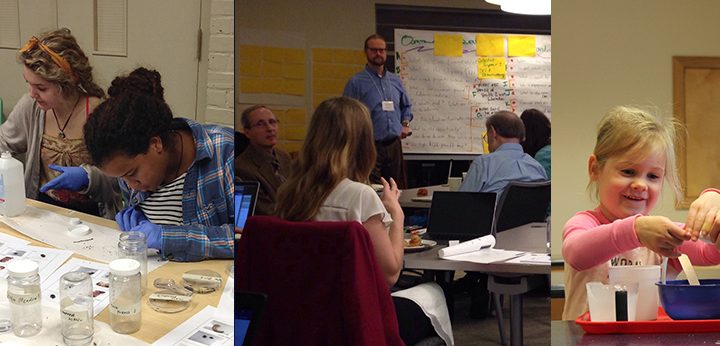NCSCE is proud to announce its newest project, Maximizing Collective Impact Through Cross-Sector Partnerships: Planning a SENCER and NISE Net Collaboration. Support for this endeavor has been provided by The National Science Foundation’s Advancing Informal STEM Learning Program (NSF-AISL 1612376). Funded as a planning grant, the goal of the initiative is to explore the potential for the collective impact of a partnership between SENCER and NISE Net (National Informal STEM Education Network), two extensive STEM networks with distinct organizational assets, to advance informal STEM learning. The project continues the expanding efforts by NCSCE and SENCER to support more informal science education projects and cross-sector partnerships.
The project progressed this past week as twenty-five thought leaders representing a variety of formal and informal science institutions gathered for a two-day meeting to identify and develop specific collaborative strategies and programs.
The energy in the room was high as the meeting began and long-term collaborators reunited or met in person for the first time to work together. After a discussion of the emerging dynamics in the landscape of STEM learning and civic engagement, participants learned about the work and strategies of several networks including SENCER, NISE Net, Humanities Action Lab, Afterschool Alliance, Portal to the Public and Mozilla Hive Network.
On the second day of the meeting, breakout groups discussed STEM learning and democracy, types of networks, and possible collaborations. Discussions also turned to ideas of more concrete projects for a partnership between NISE Net and SENCER.
Among the attendees were members of the project leadership team, including NCSCE Executive Director Eliza Reilly, Executive Director Emeritus Wm. David Burns, NISE Net leaders Larry Bell and Paul Martin, SENCER-ISE Senior Advisors Marsha Semmel and Dave Ucko, and consultant Wendy Low. Cathy Sigmond of Randi Korn & Associates, the project evaluator, also joined the meeting to observe interactions and discussions. The meeting was facilitated by Jonathan Bucki of the Dendros Group. Also in attendance were Andrea Aust of KQED, Lawrence Bell of the Museum of Science, Marcie Benne of the Oregon Museum of Science and Industry, Richard Duschl of Penn State University, David Ferguson of Stony Brook University, Laura Huerta Migus of the Association of Children’s Museums, Eve Klein of the Pacific Science Center, Elizabeth Kollmann of the Museum of Science Boston, Michelle Kortenaar of the Sciencenter Danielle Kraus Tarka of the National Center for Science and Civic Engagement, Anita Krishnamurthi of the Afterschool Alliance, Rae Ostman of Arizona State University, Rafi Santo of Indiana University, Liz Sevcenko of the Humanities Action Lab, The New School, Kyle Simmons of the National Center for Science and Civic Engagement, and Tim Watkins of the National Park Service.
The next stage of the project involves a meeting of the key leaders to further design the collaboration. As the project develops, there will be opportunities for others who are interested to get involved. Have an idea for how SENCER and NISE Net could work together to further STEM learning and increase our collective impact? Contact wendy.ncsce@gmail.com.

